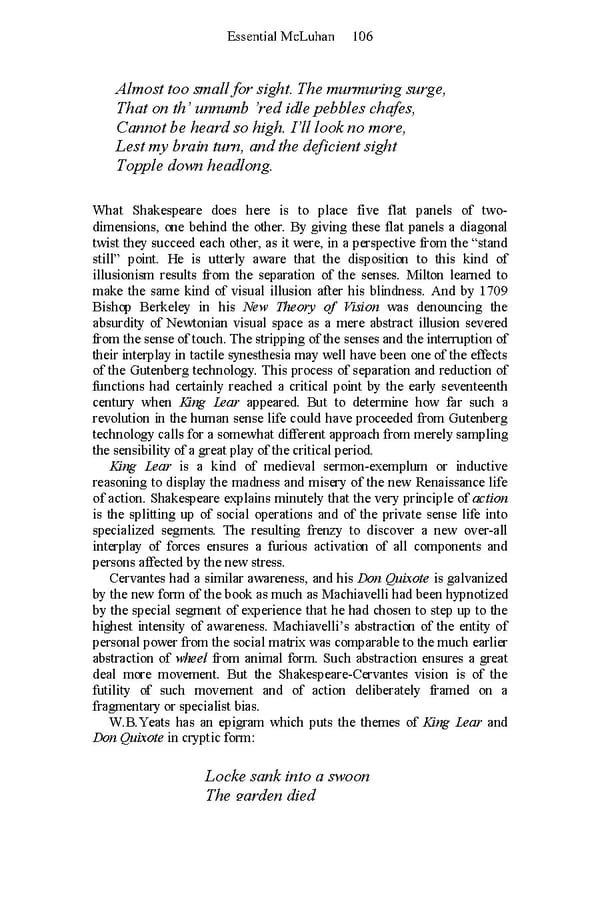Essential McLuhan 106 Almost too small for sight. The murmuring surge, That on th’ unnumb ’red idle pebbles chafes, Cannot be heard so high. I’ll look no more, Lest my brain turn, and the deficient sight Topple down headlong. What Shakespeare does here is to place five flat panels of two- dimensions, one behind the other. By giving these flat panels a diagonal twist they succeed each other, as it were, in a perspective from the “stand still” point. He is utterly aware that the disposition to this kind of illusionism results from the separation of the senses. Milton learned to make the same kind of visual illusion after his blindness. And by 1709 Bishop Berkeley in his New Theory of Vision was denouncing the absurdity of Newtonian visual space as a mere abstract illusion severed from the sense of touch. The stripping of the senses and the interruption of their interplay in tactile synesthesia may well have been one of the effects of the Gutenberg technology. This process of separation and reduction of functions had certainly reached a critical point by the early seventeenth century when King Lear appeared. But to determine how far such a revolution in the human sense life could have proceeded from Gutenberg technology calls for a somewhat different approach from merely sampling the sensibility of a great play of the critical period. King Lear is a kind of medieval sermon-exemplum or inductive reasoning to display the madness and misery of the new Renaissance life of action. Shakespeare explains minutely that the very principle of action is the splitting up of social operations and of the private sense life into specialized segments. The resulting frenzy to discover a new over-all interplay of forces ensures a furious activation of all components and persons affected by the new stress. Cervantes had a similar awareness, and his Don Quixote is galvanized by the new form of the book as much as Machiavelli had been hypnotized by the special segment of experience that he had chosen to step up to the highest intensity of awareness. Machiavelli’s abstraction of the entity of personal power from the social matrix was comparable to the much earlier abstraction of wheel from animal form. Such abstraction ensures a great deal more movement. But the Shakespeare-Cervantes vision is of the futility of such movement and of action deliberately framed on a fragmentary or specialist bias. W.B.Yeats has an epigram which puts the themes of King Lear and Don Quixote in cryptic form: Locke sank into a swoon The garden died
 Essential McLuhan Page 112 Page 114
Essential McLuhan Page 112 Page 114